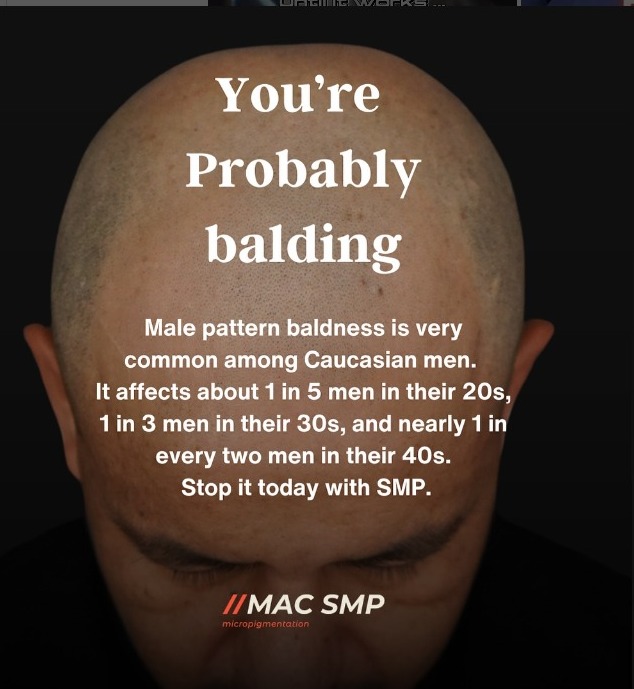It’s no secret that hair can be a source of confidence, but it can be devastating when you experience thinning or bald spots. Thankfully, Smp density, also known as scalp micropigmentation density, can help.
Smp density or scalp micro pigmentation density is an innovative treatment that replicates tiny impressions of hair follicles onto the areas that are thinning with correct pigment tones. This revolutionary procedure offers a natural-looking solution for those dealing with thinning hair or bald spots without requiring a full scalp shave, as other treatments do.

Key Takeaway
Smp density treatments effectively replicate tiny impressions of hair follicles onto thinning areas of the scalp to restore hair growth.
It is important to seek out an experienced practitioner and understand the risks and potential side effects of scalp micropigmentation density treatments to achieve desired results with minimal complications.
With a qualified scalp micro pigmentation density practitioner, you can have peace of mind knowing that scalp micropigmentation density treatment can help you regain your confidence and restore your full head of hair.
What Is Smp Density?
Smp density is a safe and effective non-surgical procedure designed to help individuals struggling with thinning hair or bald spots. This innovative treatment uses tiny impressions of hair follicles replicated onto the areas that are thinning with correct pigment tones.
Scalp micropigmentation density offers a natural-looking solution without requiring a full scalp shave, as other treatments do. Scalp micro pigmentation density is an ideal option for improving their overall appearance and self-confidence.
How Does Smp Density Work?
The procedure involves using tiny needles to replicate tiny impressions of hair follicles onto the thinning area with the correct pigment tones. The process is minimally invasive and requires no scalp shaving, meaning you can get your desired results without any major inconvenience or recovery time.
Smp Density is relatively quick and painless, so it’s a great option for those looking to improve their appearance without taking any time off work or other commitments.
The Benefits of Smp Density
Smp Density offers numerous benefits for thinning hair or bald spots. It is completely non-invasive, meaning no scalping shaving is required, and the treatment can be performed in under an hour.
This treatment option also produces natural-looking results designed to last for years, unlike other treatments, which typically require more frequent maintenance.
Lastly, it can even help to reduce the appearance of scars and stretch marks on the scalp. Scalp micropigmentation density is considered a safe and effective treatment that can help to improve your overall appearance and confidence.

Who Is Smp Density For?
Smp Density is ideal for anyone dealing with thinning hair or bald spots. It can be a great option for those looking to improve their overall appearance without taking time off work or other commitments. It is also suitable for individuals who want natural-looking and long-lasting results. Scalp micropigmentation density is also an ideal option for those wanting to reduce the appearance of scars and stretch marks on their scalp.
The SMP density treatment process
● Initial Consultation and Evaluation
Before the scalp micro pigmentation density treatment, a consultation is required to ensure that you understand what the process entails and determine your expectation for results.
The practitioner should also evaluate your medical history, scalp condition, and hair loss pattern to provide appropriate advice and select the most suitable technique for you.
● Preparation for the Treatment
Before Smp density treatments, you may be advised to take certain precautions, such as avoiding direct sun exposure or using harsh chemicals on your scalp. You’ll need to discuss with your practitioner whether medications or supplements may interfere with the expected results.
● The Smp Density Treatment
The Smp Density treatment involves applying tiny impressions of hair follicles onto the thinning areas of your scalp with correct pigment tones that imitate natural hair.
Depending on your needs, a series of treatments may be recommended to achieve desired results. You and your practitioner should discuss the frequency and length of time between different sessions.
● Aftercare and Follow-up
Careful aftercare is important to maintain Smp density results. Your practitioner should instruct you on the appropriate care regimen, such as avoiding direct sun exposure, avoiding certain products on the treated area, or using sunscreen outdoors for extended periods.
They should also provide ongoing support and assistance throughout your treatment process.
Risks and Potential Side Effects of Smp Density
While scalp micropigmentation density treatments are generally safe, there are potential risks or side effects to consider. These can include scalp irritation in the treated area, infection, allergic reactions to the pigments used in the treatments, or scalp scarring due to improper technique.
It’s important to discuss these risks and potential side effects with your practitioner before undergoing the process.
The Importance of Seeking a Qualified and Experienced Practitioner for Smp Density Treatments
It is essential that you find an experienced, qualified practitioner who has expertise in Smp Density treatments. You should also ensure they have access to the latest technology, products, and processes.
A qualified practitioner can help you understand what the treatment entails, assess your scalp condition and hair loss pattern, advise the most suitable scalp micro pigmentation density technique and guide you through the treatment process and aftercare.
Ultimately, a qualified practitioner can help you to achieve the desired results with minimal complications or risks.
Conclusion
Smp Density offers a safe, non-invasive solution for those struggling with thinning hair or bald spots.
It can also help to reduce the appearance of scars and stretch marks on the scalp. Smp density is ideal for those looking to improve their overall appearance and confidence.
If you’re considering this treatment option, be sure to speak with your doctor or hairstylist about the treatment and discuss any questions or concerns you may have before undergoing the procedure.



